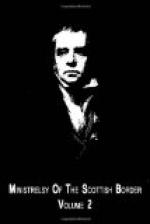The conclusion of Montrose’s melancholy history is too well known. The Scottish army, which sold king Charles I. to his parliament, had, we may charitably hope, no idea that they were bartering his blood; although they must have been aware, that they were consigning him to perpetual bondage.[A] At least the sentiments of the kingdom at large differed widely from those of the military merchants, and the danger of king Charles drew into England a well appointed Scottish army, under the command of the duke of Hamilton. But he met with Cromwell, and to meet with Cromwell was inevitable defeat. The death of Charles, and the triumph of the independents, excited still more highly the hatred and the fears of the Scottish nation. The outwitted presbyterians, who saw, too late, that their own hands had been employed in the hateful task of erecting the power of a sect, yet more fierce and fanatical than themselves, deputed a commission to the Hague, to treat with Charles II., whom, upon certain conditions they now wished to restore to the throne of his fathers. At the court of the exiled monarch, Montrose also offered to his acceptance a splendid plan of victory and conquest, and pressed for his permission to enter Scotland; and there, collecting the remains of the royalists to claim the crown for his master, with the sword in his hand. An able statesman might perhaps have reconciled these jarring projects; a good man would certainly have made a decided choice betwixt them. Charles was neither the one not the other; and, while he treated with the presbyterians, with a view of accepting the crown from their hands, he scrupled not to authorise Montrose, the mortal enemy of the sect, to pursue his separate and inconsistent plan of conquest.
[Footnote A: As Salmasius quaintly, but truly, expresses it, Presbyterian iligaverunt independantes trucidaverunt.]
Montrose arrived in the Orkneys with six hundred Germans, was furnished with some recruits from those islands, and was joined by several royalists, as he traversed the wilds of Caithness and Sutherland: but, advancing into Ross-shire, he was surprised, and totally defeated, by colonel Strachan, an officer of the Scottish parliament, who had distinguished himself in the civil wars, and who afterwards became a decided Cromwellian. Montrose, after a fruitless resistance, at length fled from the field of defeat, and concealed himself in the grounds of Macleod of Assint to whose fidelity he entrusted his life, and by whom he was delivered up to Lesly, his most bitter enemy.
He was tried for what was termed treason against the estates of the kingdom; and, despite the commission of Charles for his proceedings, he was condemned to die by a parliament, who acknowledged Charles to be their king, and whom, on that account only, Montrose acknowledged to be a parliament.




